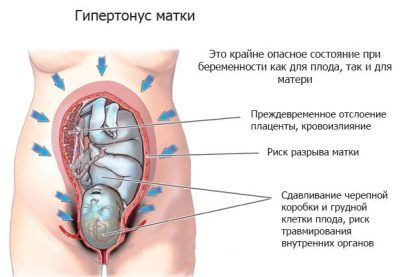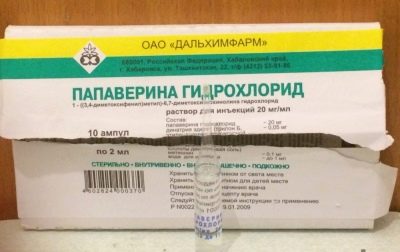Injections "Papaverina" during pregnancy: instructions for use
Hypertonicity of the uterus can be called one of the most frequent and most dangerous problems during pregnancy. To eliminate it, doctors use antispasmodic drugs, for example, Papaverin. If the situation requires immediate assistance, and the risk of miscarriage is very high, the expectant mother is prescribed such medication injections.
Features of the drug
"Papaverine" affects the smooth muscles of blood vessels and internal organs, including the muscular layer of the uterus, resulting in lower muscle tone and blood pressure. This effect allows you to use this medication. with pain syndrome caused by smooth muscle spasmsFor example, with renal colic. Wherein the injection form is faster than others (the product is also available in tablets and rectal suppositories), therefore it is in demand for emergency care.
The medicine itself is a clear sterile solution, which is poured into 2 ml ampoules. It is most often colorless, but a greenish-yellow shade is also the norm. The drug is sold in carton packs of 5 or 10 ampoules. To purchase it in a pharmacy, you must show a doctor’s prescription. The active substance of this solution is papaverine hydrochloride at a concentration of 2% (each milliliter of the drug contains 20 mg), and the excipients are methionine, sterile water and Trilon B or edetate disodium.
When are pregnant women prescribed?
The most frequent indication for the use of "Papaverine" in women in the position - it is an increase in uterine tone. Such a situation in the early stages is dangerous in that it can lead to miscarriage, and hypertonicity in the 2nd and 3rd trimester harms the development of the baby (interferes with the intake of nutrients) and can cause premature birth. Injections allow you to quickly resolve this problem. therefore, they are often chosen in situations where increased tonus is a threat to the pregnant woman and the baby in the womb.
Although the instructions for the solution do not indicate that such a drug can be used during pregnancy, gynecologists have prescribed Papaverina injections for several decades and have noted their high effectiveness. According to doctors, such injections help reduce the risk of miscarriage in the first trimester, and in the later periods prevent the onset of labor activity too early. At the same time, this medicine does not affect the development of babies.
In addition to hypertonicity, "papaverine" in injections can be used in other situations that require the rapid elimination of smooth muscle spasm. These include:
- renal colic;
- bilious colic;
- "White" fever (fever of the body with a simultaneous spasm of the limb vessels, which increases the risk of overheating of the internal organs);
- high blood pressure;
- bronchospasm;
- intestinal colic.
In all these cases, injections help to quickly relieve pain, relax the blood vessels, restore the function of organs and lower blood pressure.
Possible harm
There are certain contraindications for the use of Papaverine. If they are not taken into account, injections can cause undesirable effects. For example, the drug is not used if a woman has hypersensitivity to its components.It should not be used for tachycardia, liver disease, increased intraocular pressure, thyroid disease, AV-blockade and many other pathologies.
Sometimes "Papaverine" injections causes side effects, even if there are no contraindications for a woman.
After the introduction of the solution, drowsiness, a drop in blood pressure, headache, nausea, or an allergic reaction may be observed. In such situations, the use of this antispasmodic is refused and another therapy is selected.
How to use?
Injecting Papaverin in pregnant women requires caution, so an inpatient must make injections. The drug can be administered:
- intravenously;
- subcutaneously;
- intramuscularly.
Which method is preferable for a specific future mother, determines the doctor after the examination. Independent use of injections is strictly prohibited.
It is necessary to inject the solution into the vein very slowly to eliminate the rapid drop in blood pressure and heart palpitationstherefore, intravenous injections are usually given in the form of droppers. For them, the solution from the ampoule is further diluted with an isotonic solution of sodium chloride. When using intramuscular injections, the drug is most often injected into the area of the buttocks.
The dosage of the active substance is selected individually, but usually it is 20-40 mg per injection. Since the action of "Papaverine" is not very long, injections are performed 2 to 4 times a day at intervals of not less than four hours. How long injections should be given (for how many days “Papaverine” should be prescribed) should also be determined by a specialist taking into account the clinical picture and other factors.
As a rule, to eliminate hypertonus, "Papaverine" supplement and other drugs, as well as prescribed bed rest for pregnant women. With a high risk of abortion, a woman is hospitalized to constantly monitor her condition, since it can be complicated at any time and require the immediate help of doctors.
Analogs
If for some reason the use of "Papaverine" is impossible, most often it is replaced by a no less effective antispasmodic called "No-spa". One form of this medicine is also an injection solution, so this drug can be used in case of emergency in order to quickly relieve vasospasm and smooth muscle. This action "No-shpy" provides the active ingredient of the drug, called drotaverin. It affects smooth muscles in the same way as Papaverin, so indications for prescribing these medications are the same.
"No-shpu" is permissible to use during pregnancy, as this medicine does not provoke malformations and does not adversely affect the child. Instead of such a solution, other injectable preparations of drotaverine may be used, for example, Droverin, Spasmol or Drotaverin.




















